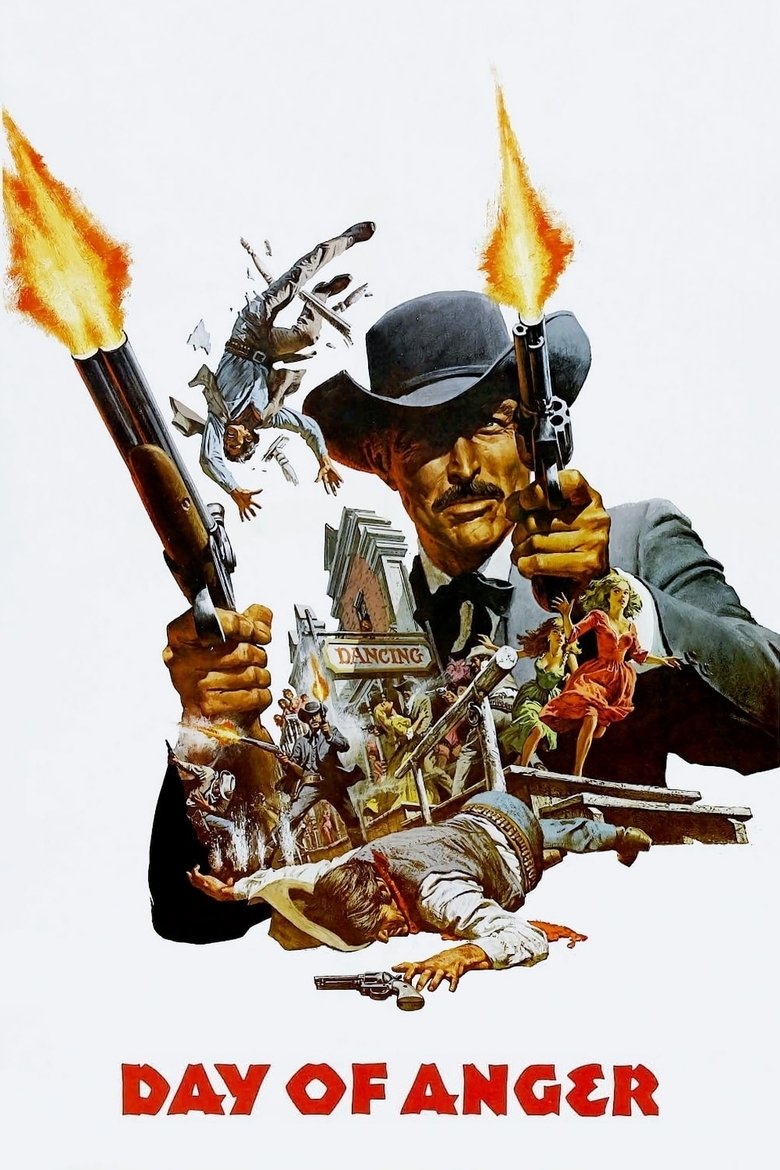
Day of Anger
A scruffy garbage boy becomes the pupil of famed gunfighter Talby, and the stage for confrontation is set when the gunman overruns the boy's town through violence and corruption.

A scruffy garbage boy becomes the pupil of famed gunfighter Talby, and the stage for confrontation is set when the gunman overruns the boy's town through violence and corruption.

The main lesson of this film may be “Never mistreat the garbage man, you don’t know how skilled of a gunslinger he is”. Kidding aside, it’s actually a great film about a character’s journey, and features a well written development hardly seen in Spaghetti Westerns, and still manages to be very entertaining.
The film tells the story of Scott (Giuliano Gemma), son of a prostitute and an unknown father, who is the garbage man in Clifton, and how he rises to a position of influence in the town, thanks to the help of Frank Talby (Lee Van Cleef)’s lessons. Scott has a phenomenal arc, as he stays in between his own goals and personality and Talby’s pulling of his strings, until the inevitable confrontation between the two. The final conflict has one of the best examples of foreshadowing and character growth in the Spaghetti subgenre.
Lee Van Cleef gives a compelling, but “typecast” performance of the old gunfighter teaching important lessons to a young man. It was his third time landing a similar role, the first being in For a Few Dollars More, and the second being Death Rides a Horse. The difference being that in this movie, the “teacher” plays a villainous role, causing it to stand out.
Giuliano Gemma gives the performance of a lifetime, getting deep into his character of Scott. He has some of the best delivered lines in Spaghetti Western history, especially after his lessons, when he obtains an important position in the town’s hierarchy. The visible changes in posture, talking and expression as his character progresses are very remarkable.
The palette in this film, contrasting with many of its genre, is especially colorful, giving it a lively, almost cartoonish feeling. Examples of this are in the gambling house scenes, that are way more vividly colored than most westerns, not only at the time, but ever. That makes the whole experience of watching very enjoyable.
In conclusion, Day of Anger is a hidden gem of the Spaghetti Western. Counting with one of the few well-established character developments in the genre, great performances by two known faces of the era, and a vivid palette, this film should be able to please most audiences.

The main lesson of this film may be “Never mistreat the garbage man, you don’t know how skilled of a gunslinger he is”. Kidding aside, it’s actually a great film about a character’s journey, and features a well written development hardly seen in Spaghetti Westerns, and still manages to be very entertaining.
The film tells the story of Scott (Giuliano Gemma), son of a prostitute and an unknown father, who is the garbage man in Clifton, and how he rises to a position of influence in the town, thanks to the help of Frank Talby (Lee Van Cleef)’s lessons. Scott has a phenomenal arc, as he stays in between his own goals and personality and Talby’s pulling of his strings, until the inevitable confrontation between the two. The final conflict has one of the best examples of foreshadowing and character growth in the Spaghetti subgenre.
Lee Van Cleef gives a compelling, but “typecast” performance of the old gunfighter teaching important lessons to a young man. It was his third time landing a similar role, the first being in For a Few Dollars More, and the second being Death Rides a Horse. The difference being that in this movie, the “teacher” plays a villainous role, causing it to stand out.
Giuliano Gemma gives the performance of a lifetime, getting deep into his character of Scott. He has some of the best delivered lines in Spaghetti Western history, especially after his lessons, when he obtains an important position in the town’s hierarchy. The visible changes in posture, talking and expression as his character progresses are very remarkable.
The palette in this film, contrasting with many of its genre, is especially colorful, giving it a lively, almost cartoonish feeling. Examples of this are in the gambling house scenes, that are way more vividly colored than most westerns, not only at the time, but ever. That makes the whole experience of watching very enjoyable.
In conclusion, Day of Anger is a hidden gem of the Spaghetti Western. Counting with one of the few well-established character developments in the genre, great performances by two known faces of the era, and a vivid palette, this film should be able to please most audiences.